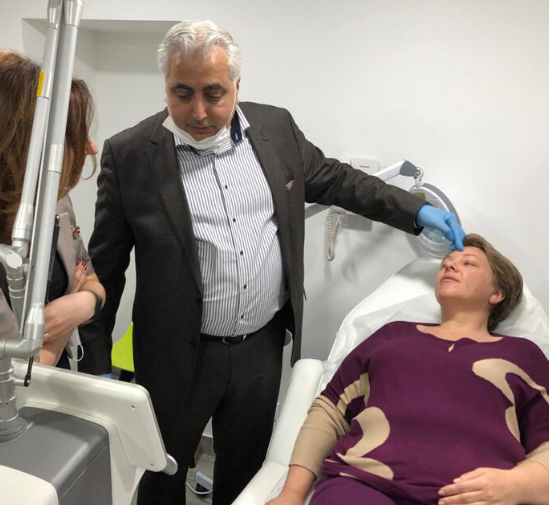 4th October 2021
4th October 2021
Pregnancy Safe Skin Care: Skincare Concerns During And After Pregnancy
Pregnancy is a magical experience but it can be fraught with several concerns, including acne, melasma, hair loss or all of the above. Navigating these changes during an already challenging time can be incredibly difficult and often the last thing anyone wants to deal with. If you’re concerned about any of these issues and would like to know how Dr Firas can help, this blog seeks to shed some light on pregnancy safe skin care and offer appropriate guidance.
Acne In Pregnancy
Acne is a common skincare concern during pregnancy. Oestrogen causes several changes in the body, and during the first trimester in particular, it can lead to acne. Hormonal fluctuations, similar to those that occur in menstruation, can lead to increased sebum production and acne. For most, any acne will fade during the second or third trimester. Yet even when this happens, it can leave scarring and pigmentation in its wake.
If you are acne-prone and have a family history of acne, you’re much more likely to suffer from the condition during pregnancy. Many products that target acne are safe to use during this time, niacinamide, azelaic acid and zinc among them. But there are some topical products that aren’t safe to use. These include, but are not limited to, retinol, benzoyl peroxide and salicylic acid. The latter is often a go-to ingredient when it comes to tackling spots and is typically included in other products, so remaining vigilant is key. Several commonly prescribed antibiotics also aren’t safe to use when pregnant. However, if you are advised to take antibiotics for acne or any other reason during pregnancy, your doctor will take this into account.
Pregnancy Safe Skin Care: ‘The Mask Of Pregnancy’
Melasma is often called ‘the mask of pregnancy’ as it frequently occurs in the second and third trimesters. Once again, this happens as a result of hormonal changes. Oestrogen, progesterone and melanocyte stimulating hormone (MSH) are the main culprits in triggering melasma. The condition often fades postpartum, but for some, this isn’t always the case.
If melasma is something that you struggle with, limiting your sun exposure, regardless of the season, is the best way to ensure it doesn’t get darker. Wearing SPF 30 or above at all times is also advised. Yet there is a catch with wearing SPF during pregnancy. Chemical sunscreens should be avoided, with mineral sunscreens providing a much more suitable alternative. A mineral sunscreen will contain zinc oxide or titanium dioxide and will be safer for you and your baby. When an expectant mother uses a chemical sunscreen, chemicals are absorbed into their bloodstream and this can lead to issues with fetal development. This is a particular concern during the first trimester but caution should be exercised throughout the entire pregnancy.
Hair Loss During And After Pregnancy
Oestrogen really is a driving factor behind a lot of skincare concerns during pregnancy, and sadly, it doesn’t just stop there – it also has the ability to impact several processes including the normal hair growth cycle. Oestrogen often causes the natural cycle of the hair follicles to slow down, so many people find that their hair seems thicker during pregnancy and end up losing less hair. This isn’t always the case. The opposite can also happen, causing an individual to lose more hair than they would typically, leading, in many cases, to noticeably thinner hair.
Postpartum hair loss is also a very common phenomenon. It is caused by a significant drop in oestrogen following delivery and will typically happen after around four months. This issue tends to resolve itself as hormones stabilise. However, that doesn’t stop many people seeking help in restoring their hairline.
Some hair loss treatments aren’t safe to use while pregnant or breastfeeding but there are other ways to combat hair loss. Ensuring you’re getting enough iron in your diet (or in the form of vitamins), avoiding hairstyles that pull on your hair such as tight ponytails and limiting the use of heat styling products will all help in the battle against hair loss.
How Dr Firas Can Help With Your Pregnancy Safe Skin Care Concerns
There are very few pregnancy-related skincare concerns that Dr Firas can’t treat. If you’re struggling with acne scarring and hyperpigmentation, there are a range of treatment options available to you. Acne scarring takes many forms and can be difficult to treat. You can find out more about this here.
Much to the disbelief of many, melasma can be treated safely during pregnancy. Some of the most effective melasma treatments can only be prescribed by a professional, so it’s best to contact one as soon as you can.
Speaking of prescription-only treatments, some hair loss treatments must also be prescribed. That being said, some are not safe to use while an individual is pregnant or breastfeeding, which makes it tricky to find a solution. If you’re at a loss as to how you can regain your confidence, it might be time to contact Dr Firas.
Get In Touch
With over twenty years of experience, there are very few conditions and concerns that Dr Firas isn’t familiar with. With his essentially infinite knowledge, he’ll know just what to suggest. After conducting a Skin Health Assessment, he’ll be able to formulate a treatment plan that suits your needs.
To find out more, get in touch with Dr Firas today by calling 0208 191 8871, emailing enquiries@drfirasalniaimi.co.uk or visiting his website. You can also follow him on Facebook and Instagram.
Back to blog






